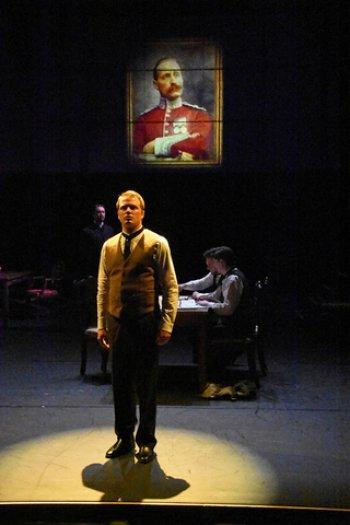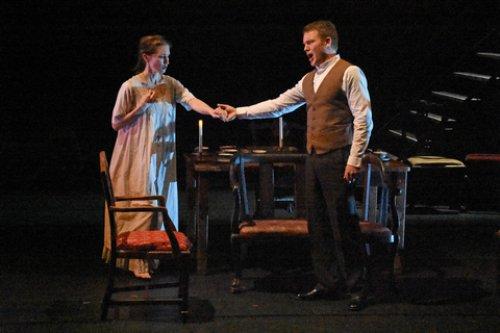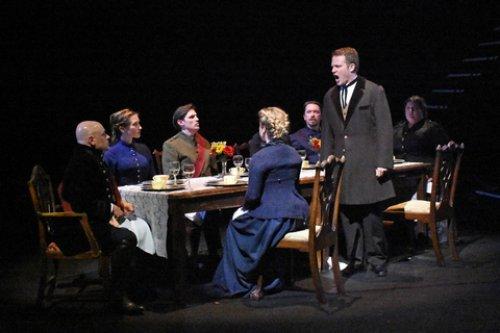Owen Wingrave
Benjamin Britten’s 1971 anti-war opera based on a Henry James story and written for television receives its local stage premiere from the little OPERA theatre of ny.

Michael Weyandt as Owen (front) with Daniel Klein (Coyle) and Daniel T. Curran (Lechmere) (rear) in a scene from the little OPERA theatre of ny’s New York premier of Benjamin Britten’s “Owen Wingrave” (Photo credit: Tina Buckman)
[avatar user=”Victor Gluck” size=”96″ align=”left” ] Victor Gluck, Editor-in-Chief[/avatar]
Although Benjamin Britten’s anti-war opera, Owen Wingrave, commissioned for television and shown by the BBC all over the world in 1971, may have been seen by more people than the world premiere of any other opera in history, it has had little attention since. However, since the appearance of a chamber version in a reduced orchestration by David Matthews in 2007, there has been renewed interest in it starting with a production at The Royal Opera, Covent Garden, in April of that year. The little OPERA theatre of ny (LOTNY) proves how durable this work is with an excellent production given four performances, double cast, at GK Arts Center in Brooklyn this month.
Britten’s interest in Henry James’ Victorian short story, “Owen Wingrave,” went back to 1955 when he had just finished his opera version of another James ghost story, The Turn of the Screw, with a libretto by critic and editor Myfanwy Piper, who would later adapt Thomas Mann’s Death in Venice for Britten’s next and final opera. It also promulgated Britten’s own pacifism which had caused him to move to New York from Britain in order not to have to fight in W.W. II which made him extremely unpopular back home, just like the hero of James’ story. Britten chose the story for his BBC television commission at the height of the Vietnam War, a veiled reminder that there had to be a better way to settle political disputes.
Witnessing the LOTNY production makes one wonder why Owen Wingrave is not performed more often: it has a small cast of eight with juicy roles for all of the characters, evenly divided between men and women’s roles, not true of either of the composer’s operas, Peter Grimes or Billy Budd. Although it makes use of the twelve tone scale, its dissonances are not hard on the ear. The plot is simple to follow and it can be performed in a unit set as was demonstrated by Josh Smith’s attractive and flexible design with six playing areas at the GK Arts Center. With the use of video or slide projections and atmospheric lighting, one can make the production as spooky as one wishes for this late Victorian ghost story.
Extremely faithful to the James story, Piper’s libretto begins at the Bayswater, London, military cramming establishment of Spencer Coyle where select young men go to prepare for admission to the Royal Military Academy at Sandhurst, the British army’s officer training center. Coyle’s best student is Owen Wingrave, the last in a long line of officers who gave their lives for their country. When Owen reveals that he can no longer continue with his studies as he has become a pacifist and thinks war a crime, he shocks both Coyle and his classmate Lechmere. Coyle agrees to visit his aunt who is currently in London and tell her his decision. She immediately orders him back to Paramore, the family seat, to face his grandfather, the elderly General Sir Philip Wingrave.

Beverly O’Regan Thiele (Mrs. Julian) and Augusta Caso (Kate) in front with Daniel Klein (Coyle) and Michael Weyandt as Owen in the rear in a scene from the little OPERA theatre of ny’s New York premiere of Benjamin Britten’s “Owen Wingrave” (Photo credit: Tina Buckman)
Back at Paramore Owen receives a chilly welcome from his irate aunt Miss Wingrave, his previously prospective fiancée Kate, and her mother the widowed Mrs. Julian who is dependent upon the Wingraves since the death of her soldier husband. War has taken not only Mrs. Julian’s husband and Kate’s father but also Owen’s father and mother who died soon after, and Miss Wingrave’s fiancé who was Mrs. Julian’s brother. Owen’s grandfather disinherits him, and Mr. and Mrs. Coyle along with Lechmere are invited for the weekend to help change Owen’s mind.
Mr. Coyle tells his wife that the house is haunted and that the figures of a Colonel Wingrave and his young son are seen walking the halls: the colonel had struck and killed his son when he had refused to fight for his honor, and then the colonel was found dead in the same room from no visible causes the following morning. When Kate calls Owen a coward he asks what he can do to prove that he isn’t. She dares him to sleep in the room in which his ancestor and his son were both found dead. In the morning, the family wakes to find that Owen has died during the night in the haunted room.
Owen Wingrave deals with the themes that preoccupied Benjamin Britten throughout his career: the outsider who finds himself in opposition to society and his community, and the betrayal of innocence. In this, it joins his other major operas like Peter Grimes, Billy Budd, Albert Herring and Death in Venice also about heroes who must defend themselves and their beliefs from the common throng. It also follows his interest in ghost stories begun with The Turn of the Screw and pacifism most memorably presented in his War Requiem.

Augusta Caso as Kate and Michael Weyandt as Owen in a scene from the little OPERA theatre of ny’s New York premiere of Benjamin Britten’s “Owen Wingrave” (Photo credit: Tina Buckman)
The score is vintage Britten making ample use of trumpet and percussion which gives the music its martial quality. Like so many 20th century operas, the orchestral score is different from the vocal one. Similar to many of Britten’s own operas, there are few arias; however, Owen has a plaintive war aria in the first act and a peace aria in the second. The opera also makes use of four orchestral interludes between the scenes of the first act like Peter Grimes’ musical seascapes. Among notable musical devices are “The Ballad” at the top of the second act describing the tragic story of the old colonel and his young son with its repeated refrain, “Trumpet blow, trumpet blow, Paramore shall welcome woe.” Though there are few duets, the first act has an effective trio of the women singing “Surely he will listen to the house,” a quartet around the words “How dare you!,” and a first act finale around the sarcastic use of the word “Scruples!”
Conductor Richard Cordova demonstrates a sure hand with the highly colored score with Indonesian gamelan influences and the eight member cast acquit themselves well with the difficult music. In the title role, baritone Michael Weyandt seemed a bit mature for the student preparing to get into Sandhurst but was sympathetic in his integrity and fortitude in the face of his family’s united front of disapproval. Bass-baritone Daniel Klein as Coyle impressed with his sense of authority, while soprano Amelia Watkins as his wife made her compassion felt. In the small double role of General Sir Philip Wingrave and the second act Narrator who is the ballad singer, (written for Sir Peter Pears, Britten’s partner and muse,) tenor Brian Downen impressed with his forcefulness and gavitas.
As Owen’s aunt, dramatic soprano Tracy Cox was formidable as the inflexible maiden lady. In the role of Kate Julian created by mezzo-soprano Dame Janet Baker, Augusta Caso demonstrated tremendous range but seemed more than a bit stiff with her ramrod posture and rigid beliefs that the military is the only honorable profession. However, she did seem to melt a bit in her final duet with Owen in the second act scene after the others have gone to bed. As her mother, soprano Beverly O’Regan Thiele evinced her conflicted feelings which are not evidenced by the other Wingrave women. Tenor Daniel T. Curran amusingly indicated Lechmere’s boyishness and as yet callow temperament.

Brian Downen (General Sir Philip Wingrave), Augusta Caso (Kate), Daniel T. Curran (Lechmere), Daniel Klein (Coyle), Tracy Cox (Miss Wingrave) and Michael Weyandt (Owen) in a scene from the little OPERA theatre of ny’s New York premiere of Benjamin Britten’s “Owen Wingrave” (Photo credit: Tina Buckman)
Director Philip Shneidman’s fine production gave the opera a cinematic feel which helped the flow of the scenes. He also made use of four performers who acted as the silent servants, as well as a children’s chorus of three for the ballad sequence. Broadway actress Penny Fuller appeared in the silent role of the housekeeper, Mrs. Thompson, who oversees the smooth running of Paramore. Along with Smith’s unit set which served for the Coyles’ establishment, Miss Wingrave’s Baker Street London home, Hyde Park, and various rooms at Paramore, projection designer Alex Basco Koch makes excellent use of the screens above the three walls of the set for outdoor sequences and indoor décor of the mansion house.
This included his slides and video of the gallery of ten portraits of Wingrave ancestors seen from various angles, views of Paramore’s house and grounds, and the documentary footage of the red-coated Horse Guards that Owen sees when he sits reading in Hyde Park. Lara de Bruijn’s late Victorian costumes included black tunic-like jackets for the women that cleverly resembled army uniforms in this most military of families. Only Smith’s lighting seemed lacking in that it offered little atmosphere for the haunted house even though without supertitles, it would have been possible to lower the lighting levels for the evening and nighttime scenes.
Unjustly neglected, Benjamin Britten’s opera Owen Wingrave proved to be an impressive evening with a strong message. The little Opera theatre of ny’s production conducted by Richard Cordova and directed by Philip Shneidman demonstrated both the opera’s musical and dramatic expertise. The eight member cast brought this Victorian story to memorable life.
Owen Wingrave (May 9 – 12, 2019)
The little OPERA theatre of ny (LOTNY)
GK Arts Center, 29 Jay Street, Dumbo, in Brookyn
For tickets, call 212-279-4200 or http://www.ticketcentral.com
Running time: two hours and ten minutes with one intermission






I thought this production caught exactly what Britten was aiming for. We saw the final performance on May 12.I was lucky to see the BBC broadcast in 1970 but had almost forgotten how powerful this opera really is. The Little Opera did a terrific job. I thought the male voices coped with the text and Britten’s music very well – really liked Owen (the singer just got it right). The female voices were good, but their enunciation left a lot to be desired. I sincerely wish that this terrific production spurs more productions of this fascinating piece.